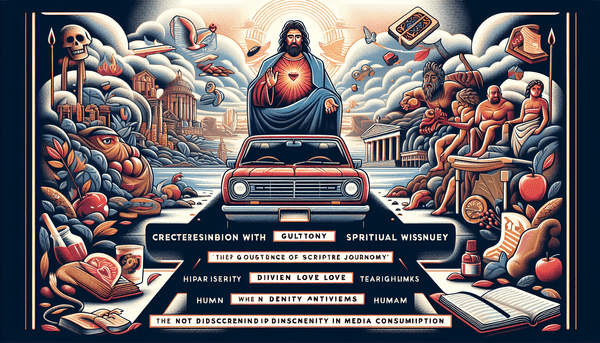The Wisdom of Seeking Understanding Before Acting
Wisdom and understanding are virtues that the Bible holds in high esteem, especially when it comes to making important life decisions. The pursuit of wisdom is not for its own sake but to navigate the intricacies of life in a way that is pleasing to God. The scriptures encourage us to 'Trust in the Lord with all your heart, and lean not on your own understanding; in all your ways acknowledge Him, and He shall direct your paths' (Proverbs 3:5-6). This call to seek divine guidance is echoed in James 1:5, which reminds us that God gives generously to those who ask for wisdom. As we contemplate the decisions before us, whether they are small or life-changing, we are invited to engage with God's word, understand the historical and cultural context of the teachings, and apply them with discernment. In doing so, we make ourselves vessels for the divine wisdom that will illuminate our path.
To Tattoo or Not to Tattoo: A Biblical Perspective
The question of whether to get a tattoo is one that Christians often ponder, and Leviticus 19:28 provides a clear directive: 'Do not cut your bodies for the dead or put tattoo marks on yourselves. I am the Lord.' However, the interpretation of this verse is subject to historical and cultural context. The Apostle Paul later speaks to the liberty found in Christ, reminding us that 'All things are lawful, but not all things are helpful. All things are lawful, but not all things build up' (1 Corinthians 10:23). In considering a tattoo, it's essential to weigh personal conviction and the cultural implications of our time. Our bodies are described as temples of the Holy Spirit in 1 Corinthians 6:19-20, so the decision to adorn ourselves with ink should be made with careful consideration of how it honors God and reflects our faith.
Does God Separate Those Who Love Each Other Sincerely?
Love and relationships are central to the human experience, and the Bible offers profound insights into how we navigate them. Yet, there are times when even sincere love faces challenges that lead to separation. The scripture doesn't shy away from the complexities of love, as 1 Corinthians 13:4-7 describes it as patient, kind, and selfless. Nevertheless, circumstances may arise that necessitate separation for the greater good, as acknowledged in Romans 8:28: 'And we know that in all things God works for the good of those who love him, who have been called according to his purpose.' While it may be difficult to understand in the moment, God's overarching plan for our lives often involves growth and learning through painful experiences. Finding peace and purpose in these situations is essential, and Proverbs 16:9 reminds us that 'In their hearts humans plan their course, but the Lord establishes their steps.'
The Biblical Perspective on Mourning and Grief
Mourning and grief are universal experiences that cross cultural and historical boundaries. The Bible acknowledges the deep pain of loss and the need for a time to mourn, as reflected in Ecclesiastes 3:1-4, which states there is 'a time to weep and a time to laugh, a time to mourn and a time to dance.' While mourning customs may vary, the Bible does not prescribe a singular way to grieve. It calls us to be a source of comfort to others, as 2 Corinthians 1:3-4 describes God as 'the Father of compassion and the God of all comfort, who comforts us in all our troubles.' By showing empathy and support, we reflect God's love and compassion to those who are experiencing the sorrow of loss.
Conclusion
As we navigate the intersections of faith and daily life, the wisdom of the Bible remains a beacon, guiding us through the uncertainties that arise. The journey to understanding is deeply personal, shaped by prayer, reflection, and the unique circumstances of each individual's life. By thoughtfully considering how biblical teachings apply to contemporary issues, we can make decisions that honor God and resonate with our personal convictions. Let us continue to walk this path with open hearts, ready to embrace the understanding that God offers, as we grow in righteousness and live out our faith in every aspect of our lives.
FAQ
Q: Does the Bible provide guidance on whether to get a tattoo?
A: The Bible does provide guidance on this topic. Leviticus 19:28 advises against tattooing, but it's also important to consider the context of this verse and how it applies to our lives today. Prayer and seeking spiritual counsel can help in making a decision that aligns with one's faith and personal convictions.
Q: Does God separate two people who sincerely love each other?
A: The Bible teaches us that love is patient and kind, but in many situations, there are circumstances that can lead to the separation of two people who sincerely love each other. Separation can be the result of problems or conflicts that cannot be resolved. God urges us to pray for wisdom and discernment in our relationships so that we can grow closer to Him and live in accordance with His will.
Q: Is it a sin not to mourn?
A: Mourning is a cultural and social practice that varies by time and place. The Bible does not specify that failing to mourn is a sin. However, it does call us to show compassion and to support those who are suffering, including those experiencing loss.






